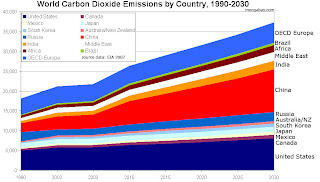The economy has definitely slowed, and everyone is feeling it. I am thinking about all those Americans that are laid off, or worse: those that are on their last unemployment check or beyond. But not just them. What about the millions that are now homeless due to flooding in India and now Vietnam, the Philippines, Maldives.....all over it seems. What is their future going to be like? How will they economically survive? How does the global financial crisis impact their lives on top of the physical emergency they find themselves in ?
The world's GDP was coasting along till recently at the growth rate of about 3.5% per year. And every year CO2 emissions have increased: from about 18.500 million metric tons in 1990 to about 26.000 million metric tons per year in 2006 --a stunning 71% increase of CO2 emissions or also an increase of around 3.5% per year. In our economy growth in world GDP has meant growth in CO2 emissions as well.
During this time only a few economists have fretted about the price that will be exacted to the natural world -- a price that has never been part of the profit driven equations. Or maybe we should ask that question the other way around: what is the price in ecological damage that will be exacted by the natural world, Gaia if you like, as response to the manifestations of greed and senseless consumption? After all, the natural resources and processes that create real wealth and allow higher levels of development are usually not extractive --they follow an economy of generosity -- and thus defy any quantitative equivalency in most economic models and thinking. In other words, the resources that nature provides, such as clean air and rain, ecological abundance, diversity, have yet to be duly calculated as real costs and benefits in prevalent economic models.
But even if you did bring those type of factors provided by nature into account --they wouldn't be able to count for the costs of natural disasters. Capitalism in the late 20th and beginning 21st century is coming to its logical conclusion within the context of resource depletion and extreme inequality, perhaps most grotesquely so in the US. Unregulated capitalism has not only been a financial disaster, it has brought ecological disaster and lately it has ruined the very pillars of democracy.
Global 'Weirding' (global warming gives the wrong impression to the masses), the melting of the 3 poles (including the Himalayas), the agricultural collapse, the drying of the Amazon, the depletion of the oceans, etc. -- they all have to do with an extractive greed driven model that monopolizes wealth and marginalizes most people in the world. The limitations of this model come into stark view when resources such as oil and food are getting scarce and inequality reaches its peak. It is now when the whole system breaks apart --it is so deeply unsustainable.
I am re-reading my own gloomy writing so far and was wondering where I might find a ray of hope --and that is where the paradox of the economy comes in.
(Note: You can view every article as one long page if you sign up as an Advocate Member, or higher).






